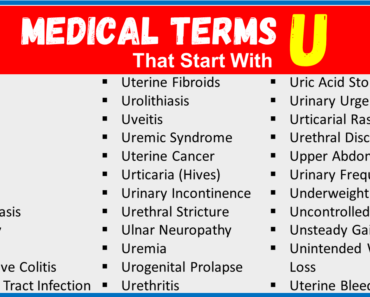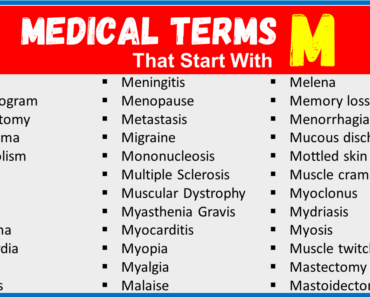The field of medicine is vast and ever-evolving, and with it comes an extensive lexicon. The letter “E” in medical terminology encompasses a myriad of terms, from diseases to medications. These terms play an essential role in understanding diagnoses, treatments, and various medical processes. Whether you’re a student, professional, or just curious, this list can serve as a guide to enhance your knowledge about medical terms associated with the letter “E.”
Medical Terms That Start With E
Here is the list of the most popular words that start with the letter E:
- Echocardiogram
- Edema
- Electroencephalogram
- Electrolytes
- Embolism
- Emphysema
- Endoscopy
- Enzyme
- Epidermis
- Epinephrine
Diseases and Conditions With E:
- Eczema
- Endometriosis
- Encephalitis
- Epstein-Barr virus
- Esophagitis
- Essential tremor
- Ewing’s sarcoma
- Exostosis
- Erythema
- Eosinophilia
Symptoms With E:
- Erythema (redness of the skin)
- Edema (swelling)
- Exophthalmos (bulging eyes)
- Epistaxis (nosebleed)
- Exudate (fluid oozing from wounds)
- Eczematous rash
- Euphoria
- Excessive sweating
- Eye pain
- Earache
Procedures With E:
- Endoscopy
- Echocardiography
- Electrocardiogram (ECG or EKG)
- Electromyography (EMG)
- Endotracheal intubation
- Excision
- Epidural anesthesia
- Esophagectomy
- Endoscopic retrograde cholangiopancreatography (ERCP)
- External beam radiation
Medications With E:
- Erythromycin
- Escitalopram
- Enalapril
- Exenatide
- Efavirenz
- Estrogen
- Epinephrine
- Eplerenone
- Enoxaparin
- Entecavir
Imaging and Tests With E:
- Electrocardiography (ECG or EKG)
- Electroencephalography (EEG)
- Echocardiography
- Electron beam computed tomography (EBCT)
- Elastography
- EMG (Electromyography)
- Epley maneuver
- Esophagram
- Endoscopic ultrasound
- Evoked potential tests
Vaccination and Immunology With E:
- Ebola vaccine
- Erythropoietin
- Epstein-Barr virus vaccine
- Enterovirus vaccine
- Edmonston-Zagreb measles vaccine
- Encephalitis vaccine
- Equine tetanus vaccine
- Ehrlichiosis vaccine
- Echinococcus vaccine
- Exanthem subitum (Roseola) vaccine
Drugs With E:
- Edoxaban
- Etoposide
- Etanercept
- Eribulin
- Eluxadoline
- Emtricitabine
- Everolimus
- Eculizumab
- Elagolix
- Eletriptan
A to Z Medical Glossary
A – B – C – D – E – F – G – H – I – J – K – L – M – N – O – P – Q – R – S – T – U – V – W – X – Y – Z
Medical Words With E & Their Meanings
- Echocardiogram – A test that uses sound waves to create pictures of the heart.
- Echolalia – The automatic and immediate repetition of words spoken by others.
- Eclampsia – Severe complications during pregnancy characterized by seizures.
- Ectopia – An abnormal location or position of an organ or a body part.
- Ectopic pregnancy – A pregnancy outside of the uterus, typically in a fallopian tube.
- Edema – Swelling caused by excess fluid trapped in the body’s tissues.
- EEG (Electroencephalogram) – A test to measure and record the electrical activity of the brain.
- Efferent – Conducting or conveying away from a center.
- Ehrlichiosis – A bacterial illness transmitted by ticks causing flu-like symptoms.
- Ejaculation – The release of semen from the male reproductive system.
- Elastase – An enzyme that breaks down elastin, a protein found in connective tissues.
- Elastography – A medical imaging technique used to detect the stiffness of soft tissue.
- Electrocardiogram (ECG/EKG) – A test that measures the electrical activity of the heart.
- Electrolyte – Minerals in the blood and other body fluids that carry an electric charge.
- Electromyogram (EMG) – A test used to measure the electrical activity of muscles.
- Electrophoresis – A method for separating molecules based on their charge and size.
- Emboli – Blood clots or other obstructions in blood vessels.
- Embolism – A sudden blocking of an artery.
- Embolization – A procedure to block blood flow to a specific area or organ.
- Emesis – Vomiting.
- Emetic – A substance that induces vomiting.
- Empyema – A collection of pus in a body cavity, especially the pleural cavity.
- Encephalitis – Inflammation of the brain.
- Encephalopathy – A general term for any disorder or disease of the brain.
- Endemic – A disease or condition regularly found in a particular area or population.
- Endocarditis – Inflammation of the inner lining of the heart.
- Endocrinology – The study of the body’s endocrine glands and their secretions.
- Endoscope – A flexible tube with a light used to view the inside of certain body parts.
- Endoscopy – A procedure where an endoscope is used to examine the interior of a hollow organ or cavity.
- Endothelium – The thin layer of cells lining the interior surface of blood vessels.
- Enema – A fluid injected into the lower bowel for cleansing or therapeutic purposes.
- Engorgement – Overfilling of a body part with blood or other fluids.
- Enucleation – Surgical removal of the eyeball.
- Eosinophil – A type of white blood cell involved in allergic reactions and fighting certain infections.
- Epidermis – The outermost layer of the skin.
- Epidural – An injection into the space around the spinal cord, often to provide anesthesia.
- Epiglottis – A flap of tissue that covers the windpipe to prevent food and drink from entering the lungs.
- Epilepsy – A neurological disorder marked by recurrent, unprovoked seizures.
- Episiotomy – A surgical cut made during childbirth to enlarge the vaginal opening.
- Epistaxis – Nosebleed.
- Erythema – Redness of the skin caused by increased blood flow.
- Erythrocyte – A red blood cell.
- Erythropoiesis – The production of red blood cells.
- Eschar – Dead tissue resulting from a burn, injury, or pressure ulcer.
- Esophagus – The tube connecting the mouth to the stomach.
- Essential amino acid – An amino acid that the body cannot produce on its own and must obtain from the diet.
- Estrogen – A hormone produced primarily by the ovaries that regulates the female reproductive system.
- Etiology – The cause or origin of a disease.
- Eustachian tube – A canal that links the middle ear with the throat area.
- Euthanasia – The act of ending a life to relieve pain or suffering.
- Evacuant – A substance that promotes the evacuation of bowels.
- Exacerbation – A worsening or increase in severity of a disease or its signs and symptoms.
- Excretion – The process of eliminating waste products from the body.
- Exfoliation – The shedding or peeling off of dead skin cells.
- Exhalation – The process of breathing out.
- Exostosis – A benign growth on the surface of a bone.
- Expectorant – A drug that promotes the expulsion of mucus from the respiratory tract.
- Exsanguination – Severe loss of blood to the point of death.
- Extracellular – Located outside the cells.
- Extracorporeal – Taking place outside the body.
- Extraction – The act of removing something, such as a tooth.
- Extravasation – The leakage of fluids, like blood or medicine, from a vessel into surrounding tissues.
- Exudate – Fluid that leaks from blood vessels into nearby tissues.
- Eyelet – A small round hole or perforation, typically in the eyelid for drainage.
- Eyelid ptosis – Drooping of the upper eyelid.
- Euthyroid – Normal thyroid function.
- Eversion – Turning outward.
- Endorphins – Neurotransmitters that act as natural painkillers.
- Endometriosis – A condition where tissue similar to the lining of the uterus grows outside the uterus.
- Ergonomics – The study of people’s efficiency in their working environment.
- Esotropia – Inward turning of one or both eyes.
- Exophthalmos – Abnormal protrusion of the eyeball.
- Epithelium – The thin tissue forming the outer layer of a body’s surface and lining the alimentary canal and other hollow structures.
- Enteric – Relating to, or affecting the intestines.
- Enteropathy – Any disease of the intestines.
- Enterovirus – A type of RNA virus that can cause a variety of diseases.
- Endoscope – An instrument used to visually examine the interior of a hollow organ or cavity.
- Enzyme – A substance produced by a living organism that acts as a catalyst to bring about specific biochemical reactions.
- Epiphysis – The end part of a long bone, which grows separately from the shaft.
- Exocrine – Glands that produce and secrete substances onto an epithelial surface by way of a duct.
- Exudative – Relating to or marked by exudation.
- Enteral – Relating to or occurring in the intestines.
- Epileptogenic – Causing or tending to cause epileptic seizures.
- Exophoria – A tendency of the eyes to deviate outward.
- Entropion – A condition in which the eyelid is rolled inward.
- Euphoria – A feeling or state of intense happiness and excitement.
- Exocytosis – The process by which cells transport secretory vesicles to the cell membrane and release their contents.
- Eclamptic – Relating to or affected by eclampsia.
- Eosinophilia – An increased number of eosinophils in the blood.
- Enteritis – Inflammation of the intestine.
- Esophagitis – Inflammation of the esophagus.
- Epidermolysis – The detachment of the epidermis from the dermis.
- Epidemiology – The study of diseases in populations, their causes, distribution, and control.
- Eustress – A positive form of stress that can motivate an individual.
- Exostectomy – Surgical removal of a bony growth.
- Ectoderm – The outermost layer of cells in the early embryo.
- Endoderm – The innermost layer of cells in the early embryo.
- Ectoparasite – A parasite that lives on the external surface of its host.
- Endosymbiosis – The theory that certain organelles in eukaryotic cells originated as free-living bacteria that were taken into another cell.
- Echinococcosis – A parasitic disease caused by tapeworms of the genus Echinococcus.
- Electroretinography (ERG) – A diagnostic test to measure the electrical activity in the retina of the eye.
- Escharotomy – A surgical procedure that cuts through an eschar to relieve pressure and prevent further tissue damage.







